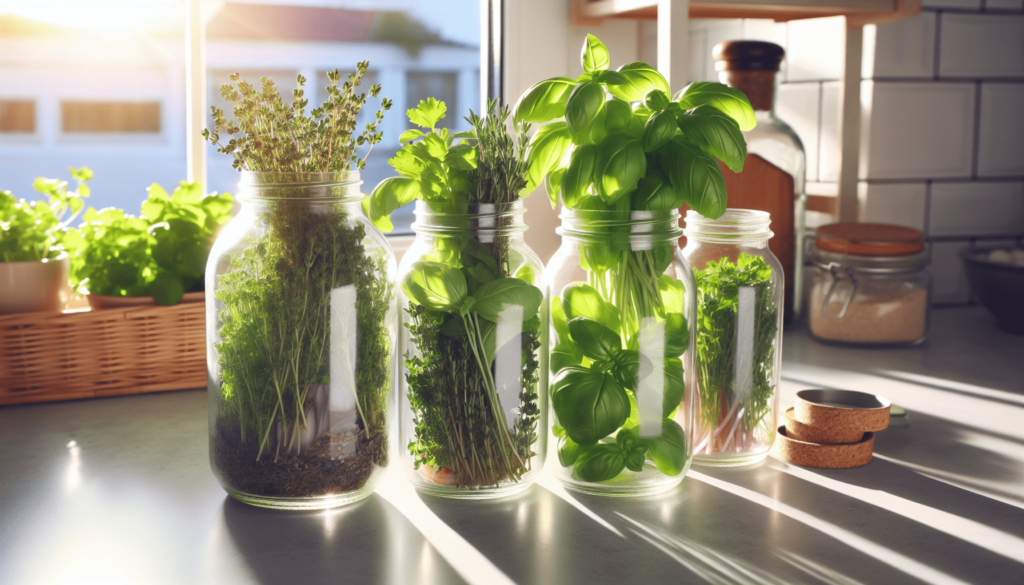What’s the Best Way to Store Fresh Herbs?
What’s the best way to store fresh herbs? If you’re a fan of adding a touch of green to your dishes, you’re probably wondering how to keep your herbs fresh for as long as possible. In this article, we’ll explore the different methods of storing fresh herbs and help you determine the best way to preserve their flavor and aroma.
The Importance of Proper Herb Storage
Before we dive into the various methods of storing fresh herbs, let’s talk about why it’s important to store them correctly. Herbs are delicate and prone to wilting and losing their flavor quickly if not stored properly. By taking the time to learn how to store them correctly, you can ensure that your herbs stay fresh and flavorful for longer periods.
Why Proper Storage Matters
Proper storage of fresh herbs can make a significant difference in the taste and quality of your dishes. When herbs are stored incorrectly, they can lose their flavor and aroma quickly, leaving you with bland and uninspired meals. By storing your herbs correctly, you can prolong their shelf life and enhance the overall flavor of your culinary creations.
Different Methods of Herb Storage
There are several methods you can use to store fresh herbs, each with its own pros and cons. Let’s take a look at some of the most common ways to store herbs and discuss the best practices for each method.
Refrigerator Storage
Storing fresh herbs in the refrigerator is one of the most popular methods for preserving their freshness. To store herbs in the refrigerator, follow these steps:
- Trim the ends of the herbs and remove any wilted or damaged leaves.
- Place the herbs in a glass of water, similar to how you would store fresh flowers.
- Cover the herbs loosely with a plastic bag or damp paper towel.
- Store the herbs in the refrigerator’s vegetable crisper drawer.
Refrigerator storage works well for hardy herbs like rosemary, thyme, and sage. However, delicate herbs like basil, cilantro, and parsley may wilt quickly in the refrigerator, even when stored properly.
Freezing Herbs
Freezing fresh herbs is another popular method of preserving their flavor. To freeze herbs, follow these steps:
- Wash and dry the herbs thoroughly.
- Chop the herbs finely or leave them whole, depending on your preference.
- Place the herbs in an ice cube tray.
- Cover the herbs with water, olive oil, or broth.
- Freeze the herbs until solid, then transfer the herb cubes to a resealable bag.
Freezing herbs works well for herbs that are commonly used in cooking, like basil, parsley, and cilantro. Frozen herbs may lose some of their texture when thawed, but their flavor will remain intact.
Drying Herbs
Drying fresh herbs is a traditional method of preserving their flavor and aroma. To dry herbs, follow these steps:
- Tie the herb sprigs together with string or twine.
- Hang the herbs upside down in a warm, dry place with good air circulation.
- Allow the herbs to dry for 1-2 weeks until they are crisp.
- Remove the dried leaves from the stems and store them in an airtight container.
Drying herbs works well for hardy herbs like rosemary, thyme, and oregano. Delicate herbs like basil and parsley may lose their flavor when dried, so it’s best to use them fresh whenever possible.

Best Practices for Storing Fresh Herbs
Now that you know the different methods of storing fresh herbs, let’s discuss some best practices to ensure that your herbs stay fresh and flavorful for as long as possible.
Use Fresh Herbs Whenever Possible
The best way to enjoy the full flavor and aroma of fresh herbs is to use them as soon as possible after harvesting or purchasing. Fresh herbs have a vibrant flavor that can’t be replicated by dried or frozen herbs.
Store Herbs in a Cool, Dark Place
If you’re not planning on using your fresh herbs right away, store them in a cool, dark place to help prolong their shelf life. Keep delicate herbs like basil and parsley out of direct sunlight, as exposure to light can cause them to wilt quickly.
Label Your Herb Containers
To avoid confusion and mix-ups, be sure to label your herb containers with the name of the herb and the date it was harvested or purchased. This will help you keep track of how long the herbs have been stored and when it’s time to use them up.
Check Your Herbs Regularly
Check your stored herbs regularly for signs of wilting, mold, or discoloration. Remove any wilted or damaged leaves as soon as you notice them to prevent the spread of mold or bacteria to the rest of the herbs.
Table of Herb Storage Methods
To help you determine the best storage method for your fresh herbs, here’s a table summarizing the pros and cons of each method:
| Storage Method | Pros | Cons |
|---|---|---|
| Refrigerator | Keeps herbs fresh for longer | Delicate herbs may wilt quickly |
| Freezing | Preserves flavor and aroma | Texture may change when thawed |
| Drying | Longer shelf life | Delicate herbs may lose flavor when dried |
Conclusion
In conclusion, the best way to store fresh herbs depends on the type of herb and your personal preferences. Experiment with different storage methods to find the one that works best for you and helps you enjoy fresh herbs in your cooking for as long as possible. By following the tips and best practices outlined in this article, you can ensure that your herbs stay fresh, flavorful, and ready to enhance your culinary creations.
